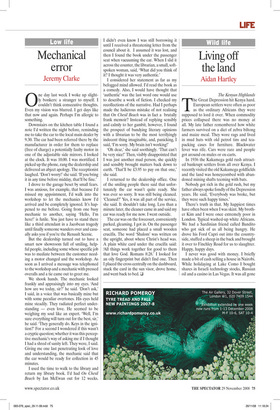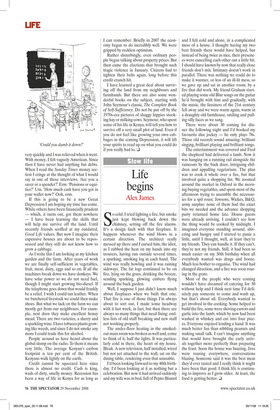Living off the land
Aidan Hartley
The Kenyan Highlands The Great Depression hit Kenya hard. European settlers were often as poor as the ordinary Africans they were supposed to lord it over. When commodity prices collapsed there was no money at all. My late father remembered how white farmers survived on a diet of zebra biltong and maize meal. They wore rags and lived in mud huts with old petrol tins and teapacking cases for furniture. Blackwater fever was rife. Cars were rare and people got around on mules or ox-carts.
In 1936 the Kakamega gold rush attracted bankrupt settlers from all over Kenya. I recently visited the old Kakamega goldfields and the land was honeycombed with abandoned mining shafts teeming with bats.
Nobody got rich in the gold rush, but my father always spoke fondly of the Depression years. He said, ‘Everybody was broke, but they were such happy times.’ There’s truth in that. My happiest times have often been when I was skint. My brother Kim and I were once extremely poor in London. Typical washed-up white Africans. We had a Sardinian friend called Bandito who got sick of us all being hungry. He drove his Ford Capri out into the countryside, stuffed a sheep in the back and brought it over to Finchley Road for us to slaughter. Happy, happy days.
I never was good with money. I briefly made a bit of cash selling a house in Nairobi. While holidaying at Lake Como I bought shares in Israeli technology stocks, Russian oil and a casino in Las Vegas. It was all gone very quickly and I was relieved when it went. With money, I felt vaguely American. Since then I have never had anything but debts. When I read the Sunday Times money section I cringe at the thought of what I would say in one of those interviews. ‘Are you a saver or a spender?’ Erm. ‘Pensions or equities?’ Um. ‘How much cash have you got in your wallet now?’ Ooh, erm.
If this is going to be a new Great Depression I am hoping my time has come. While others have been financially prudent — which, it turns out, got them nowhere — I have been learning the skills that will help me survive off the land. Until recently friends scoffed at my outdated, Good Life values. But now I imagine their expensive houses are about to be repossessed and they still do not know how to grow a cabbage.
As I write this I am looking at my kitchen garden and the farm. After years of work we are finally self-sufficient in vegetables, fruit, meat, dairy, eggs and so on. If all the machines break down we have donkeys. We have solar power so we do not need fuel, though I might start growing bio-diesel. If the telephone goes down that would frankly be a relief. I wish I could tan leather. When we butchered livestock we could then make shoes. But what we lack on the farm we can mostly get from our neighbours. For example, next door they make excellent honey mead. There are two varieties, a sherry and a sparkling wine. I have tobacco plants growing like weeds, and since I do not smoke any more I could trade this for alcohol.
People around us have heard about the global slump on the radio. To them it means very little. The average Kenyan’s carbon footprint is ten per cent of the British. Kenyans walk lightly on the earth.
Credit cannot be squeezed here since there is almost no credit. Cash is king, wads of dirty, smelly money. Recession has been a way of life in Kenya for as long as I can remember. Briefly in 2007 the economy began to do incredibly well. We were gripped by reckless optimism.
Rather disturbingly, even ordinary people began talking about property prices. But then came the elections that brought such tragic violence in January. Citizens had to tighten their belts again, long before this credit crunch hit.
I have learned a great deal about surviving off the land from my neighbours and farmhands. But there are also some wonderful books on the subject, starting with John Seymour’s classic, The Complete Book of Self-Sufficiency. Do not be put off by the 1970s-era pictures of shaggy hippies stooking hay or milking cows. Seymour, who spent some of his life in Kenya, will tell you how to survive off a very small plot of land. Even if you do not feel like growing your own cabbages in the coming Depression, it will lift your spirits to read up on what you could do if you really had to. ❑



































































































 Previous page
Previous page